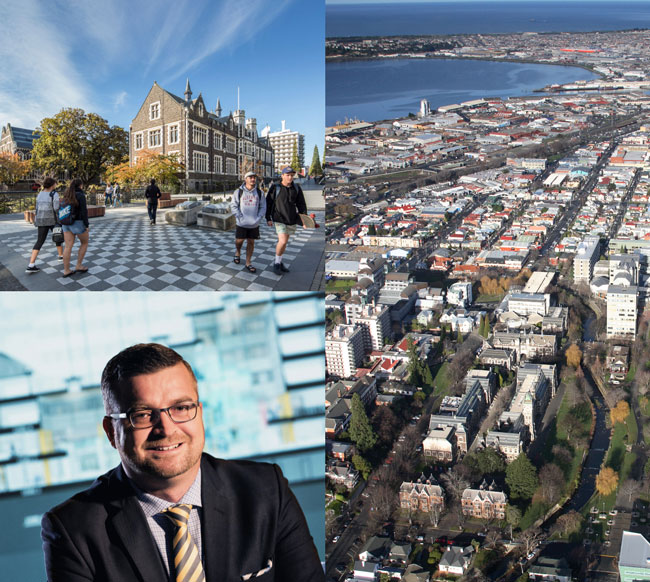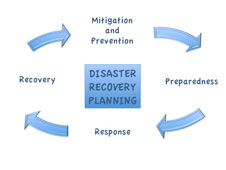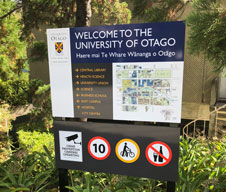Tuesday 15 May 2018 10:18pm

Priorities for supporting students and staff – Chief Operating Officer Stephen Willis (bottom left) and his executive have set three key priorities for the Operations Group this year.
The Operations Group’s three over-arching priorities this year are transforming technology, services and support, and the built environment.
1. Transforming services and support
Academically
Fostering relationships and a partnership with academic divisions is key because they “rely on us for a range of enabling support and services and we must provide excellence”, the University's Chief Operating Officer Stephen Willis says.
That means working closely together and developing a strong understanding of each other’s challenges and future directions, through frequent and consistent contact in person, along with strong feedback loops.
“So we can be responsive and adaptive … for each other.”
Because providing buildings and technology usually evolves over years, the Operations Group needs to know where academic divisions are heading so “we can travel the path together, not when it becomes a last-minute emergency”.
Students
Proactively engaging and collaborating with students is another key priority – “it’s consumer engagement”.
“Those who don’t engage with their consumers and adapt services to meet changes in demands and expectations do so at their peril,” he says.
“How do we know what is truly an exceptional student experience if we don’t involve them in defining it and helping us shape it for them?”
Professional development
Developing in-house training and development opportunities is also a priority for all Operations Group divisions this year because “to continue to deliver excellence we need to continuously improve”.
“Given we are a University, I am confident we can develop our own comprehensive programme that taps into a wide range of internal and external expertise.”
While domestic and international conferences are appropriate for some learning needs, Mr Willis believes they are not always the best solution because they are usually expensive and not many people benefit from them, while in-house training is less expensive and far more people can benefit from it.
Off-campus
Because the health and safety of students and staff is not only important while they are on campus, the Operations Group is introducing monitoring systems for the wide range of locations around New Zealand and the world where students and staff do research, fieldwork and other University business.
Emergencies

Disaster recovery planning.
Getting the University back to business-as-usual quickly after a disaster of any type is also a focus for the Operations Group, which is putting plans and measures in place to help minimise the impacts.
“Quite frankly,” Mr Willis says, “I would rather be responding from the realms of a well developed and tested response plan.”
Financial
Financially, the Operations Group has to use its resources as effectively as possible and find more opportunities to earn money from external sources.
The University will be borrowing money for the first time in its history and to its maximum borrowing capacity, so “our current situation where expenses continue to grow faster than income is not sustainable”, he says.
Support Services Review
The University has committed to the Support Services Review and the Operations Group needs to embed the outcomes into its operations.
Doing everything possible to get that implementation bedded down – and in a sustainable fashion – is critical. Giving people support where necessary and being adaptable and flexible will be vital.
2. Transforming technology
App-titude
Transforming Technology includes launching a Student App this year so students and staff get the information they want when they want it.
Because people live through their mobile devices now, the University needs to create direct real-time engagement, while also sparking opportunities for new services – like texting to pre-order coffee and food for example, Mr Willis says.
More tech priorities
Identifying and creating the right technology tools, systems and training for the future is another priority.
Doing that will involve prioritising the University’s existing processes, procedures and workflows then re-mapping them – which is vital to successfully implementing the Support Services Review.
“Over the coming years, that process will progressively broaden out across the remainder of the Operations Group and rest of the University,” he says.
Because students and staff rely on robust, fast and reliable technology, IT Systems Projects is another priority, as an essential component of all the University’s major building projects.
The Operations Group’s priority of transforming technology also includes supporting the creation of a Business Intelligence Strategy for the University.
3. Transforming the built environment
Wayfinding

One of the new signs on campus in Dunedin.
Making it easy for people to find their way around campus and having consistent, accessible and bi-lingual signs will start with creating a Campus Wayfinding and Signage Strategy.
It will spark the development of heritage and cultural trails while also producing guidelines for digital and static signs that cater for all users, and help people easily navigate the complex and diverse facilities on the University’s campuses.
Sustainability
Raising awareness of sustainability, changing behaviour and creating a profile as a leader in the sustainability field is another priority, so the University can build a recognisable brand that brings all its efforts together.
Not only does sustainability make the best use of resources, it is also important to students the University is trying to attract, Mr Willis says.
Important projects
The University has to spend almost $200 million to ensure some buildings meet modern compliance, accreditation and health and safety standards, while also finishing major projects like the Faculty of Dentistry new build and redevelopment, the Research Support Facility, and the Music Theatre and Performing Arts development.
That constricts the University’s ability to do more projects and has prompted the Operations Group to examine this year whether existing space can be used more effectively.
More priorities
Other ways of focusing on buildings include:
- Increasing the University’s effectiveness at managing its property, built and information technology (IT) assets from a rating of core to intermediate
- Improving construction and IT project management maturity and University project portfolio management maturity by developing more standardised processes, practices and measurements of outcomes
- Finishing the building Design Guidelines for the University
- Ensuring consultants and contractors have the right expertise for the job and focus on quality and safety, to reduce risk and maintain the University’s great reputation
